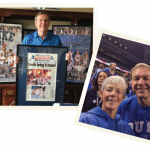When asked what has been the greatest success of the REF’s first 25 years, each of these leaders had a different view. Dr. Kelley notes that the “current focus on finding the cure for RA is a good direction to take.” Dr. O’Dell says that the rheumatology community staying united in terms of helping to secure the future of rheumatology was key. And, as Dr. St.Clair points out, “The REF has created a nice interface between private practice and academics with programs like the ambassadors and diplomats [a REF volunteer program]. Younger clinicians are coming into rheumatology because it’s exciting, with the new drugs as well as the emerging science.”
Heather Haley is a freelance medical writer based in Cincinnati.
REF Education Investment Yields Positive Results
While other medical specialties report declines in applicants to training programs, the number of rheumatology fellows completing training is 76% higher than it was a decade ago. Today, the REF funds four preceptorships and seven education and training awards, including a fellowship for pediatric rheumatology.
Audrey Uknis, MD, associate dean of admissions and professor of medicine at Temple University School of Medicine in Philadelphia, received an early Physician Scientist Development award (now called the Rheumatology Scientist Development Award). “The REF award had an immeasurable impact on my career,” she says. “I was able to transition from my fellowship into a junior faculty position.” Without the award, no funded faculty position would have existed for Dr. Uknis.
A secondary benefit of the award was that it inspired Dr. Uknis to volunteer with the ACR and REF. After she received the award, Dr. Uknis was invited to participate in the strategic planning process in 1994. “From that activity, I gained the sense that this is an organization that I would enjoy working with throughout my career,” says Dr. Uknis. She is currently treasurer of the ACR and the REF.
REF training programs targeting both medical students and graduate students draw talented trainees from many disciplines. Kaleb Michaud, PhD, received an REF preceptorship while completing his physics doctorate at Stanford University in Stanford, Calif. Now an assistant professor of internal medicine at the University of Nebraska Medical Center in Omaha, Dr. Michaud is a co-investigator for the National Data Bank for Rheumatic Diseases (NDB) and studies long-term patient outcomes.
Dr. Michaud’s interest in rheumatology started through a personal connection with Fred Wolfe, MD, founder of the NDB. Precepted by Eliza Chakravarty, MD, assistant professor in rheumatology at Stanford University, Dr. Michaud studied the impact of total joint replacement on outcomes in RA patients. “The REF preceptorship provided money and incentive to work closely with a rheumatologist and side by side with MD/PhDs doing outcomes work, which was critical, since my advisors were in the school of humanities and sciences,” says Dr. Michaud. “After the preceptorship ended, I remained active in the rheumatology division, participating in journal clubs and seminars.”
